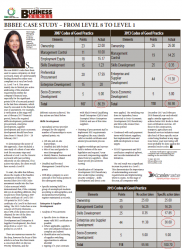Vash Singh : BBBEE Case Study - From Level 8 To Level 12017-12-07 Vash Singh, Managing Director â€" Xcelerate Verification Agency (formerly Izikhulu BEE Ratings)
Since the new BBBEE codes have been used to assess companies on their scorecard, many are unfortunately finding themselves either non-compliant or at very low levels i.e. Level 7 or 8. This arises mainly due to limited pro-active addressing of the amended requirements within the company’s financial year, especially for the significant points (63% of scorecard points) in the last three elements, which must be executed in the financial year of assessment. For example, a verification at this stage will use a February 2017 financial period, hence the required skills development, preferential procurement, enterprise development, supplier development and socio-economic development should have been done from 01 March 2016 â€" 28 February 2017. To demonstrate the power of this approach, I have included a case study of a client of ours who took the necessary steps and achieved a Level 1 on the Generic scorecard with just working effectively on two elements. If no action was taken, the client would have scored a Level 8! To start, the table that follows, shows the results of the baseline assessment of this client. We inserted their 2016 Old Codes assessment results into the New Codes scorecard which demonstrated that, if the company did not do anything different, they would move from having a 2007 Codes certificate of Level 2 (85 â€" 100 points) to 2013 Codes certificate of a Level 8 in their next rating. The 2013 Codes have a new concept of Priority Elements â€" since 40% of the points were not obtained for two of the three Priority Elements (Skills Development and Enterprise & Supplier Development), the client drops from a Level 7 (55 â€" 70 points) to a Level 8. There are numerous reasons for the drop, however the focus of this article is on how the client made a concerted effort on the two Priority Elements, and the different outcome achieved. The key actions are listed below: Skills Development
o Disabled and able-bodied o Mix of race and gender to meet demographics o Mainly finance, business and administrative-related
o Where applicable, suppliers were sent affidavit formats to complete and submit o Identification and actioning of supplier switching opportunities to address shortfall o Signing of 3-year contracts with Black Owned Qualifying Small Enterprises (QSEs) and Exempted Micro Enterprises (EMEs) and use of first-time suppliers
Xcelerate Verification Agency assists companies with understanding and tracking on the new BBBEE Codes. T: 0861 505 555 info@xcelbee.co.za www.xcelbee.co.za |
Vash Singh : BBBEE Case Study - From Level 8 To Level 1
Copyright © 2024 KwaZulu-Natal Top Business
